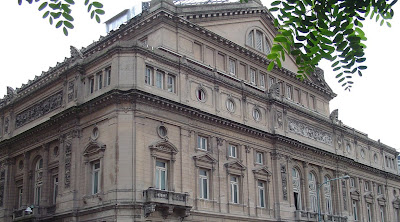
Tomás Nessi, will be giving a piano recital for Mozarteum Argentino, at Teatro Gran Rex on September 21. The program will include works of Frédéric Chopin and Sergei Prokofiev. Tickets are free and can be requested at the theater's box office a few hours before the show.
It's a curious thing the music this Spring brings us. Tomás won the 2009 Biennale Youth Contest, so it's interesting that this year right after watching him, we get to listen to the winner of this year's edition. How lucky!
Tomas' resume is long for his age: 20. He started his formal studies in La Plata, Province of Buenos Aires, at the age of 9 but he first approached piano at 5.
He has given recitals in La Plata, in various concerts halls in the city of Buenos Aires and also throughout different provinces of Argentina.
He has performed solo with the Chamber Orchestra of the City of La Plata, Academic Camerata of the Teatro Argentino de La Plata and Symphony Orchestra of the Argentinian Public Television, under the direction of Roberto Ruiz, Carlos Sampedro, Bernardo Teruggi and Marcelo Zurlo.
In 2004, he won third prize in the First National Contest for Young Players organized by Radio Nacional and Temporada Allegretto in Argentina.
In 2005, he won second prize in the contest "Constructing Peace and Unity", organized by Northlands School and Asociación Música Viva.
In 2006, he got first prize at the "Alberto Ginastera" National Piano Contest, organized by Scala de San Telmo and the International Contemporary Music Encounters Foundation. This allowed him to offer a recital in the International Festival of Contemporary Music directed by composer Alicia Terzian in 2008.
In 2009, he won the Shell-Festivales Musicales Biennale Contest for Young Talents, and later toured some provinces of Argentina and recorded a CD along with the winner of the Singing and Chamber Music categories.
In 2010, he won three scholarships that allowed him to keep expanding his talent: Fondo Nacional de las Artes', Mozarteum Argentino and Instituto Cultural de la Provincia de Buenos Aires.
In 2011, a German Academic Exchange Service granted him a scholarship to continue studying at La Hochschule für Musik und Tanz Köln, Colonia Germany.
We hope you enjoy this program and this musical month in Buenos Aires.






